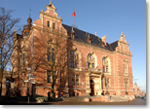Secretariat
Wały Jagiellońskie 1
80-853 Gdańsk Poland
tel. +48 58 301 09 17
tel. +48 58 301 91 23
fax +48 58 301 76 37
 Contact us
Contact us


Cooperation through Networking - Contributions by the Cities in the Baltic Sea Region
Speech by Mr Anders Engström at "Forum Northern Dimension", Schwerin 1st of September 2000
I would like to start by congratulating the organisers of this conference for including the theme, "Cooperation through Networking - Contributions by the Cities in the Baltic Sea Region", under the main theme of this conference, which is the Northern Dimension. I am certain that the cities will play an important role in the implementation of the Northern Dimension.
The Northern Dimension is an addition to the general policy of the European Union, and comprises circumstances that were brought into the Union together with Finland and Sweden. Such circumstances are for example the proximity to the Russian Federation, climatic conditions that differ from the continental Europe, and so on.
The accession of Sweden and Finland has also brought the Baltic Sea to the European Union. Our region will be further accentuated when the EU enlargement process is finished and the Baltic Sea almost will be an inland sea of the European Union, with the exemption of the coast-line of the Russian Federation.
The co-operation across the Baltic Sea is impressing indeed. It takes place at all levels, from the governmental level with CBSS, Helcom and so on down to personal connections between institutions, associations and individuals.
My own organisation, the Union of the Baltic Cities, is a network of almost 100 cities in ten countries in the Baltic Sea Region. We are a growing organisation that has trebled the number of member cities since our foundation in 1991. Our political strength has also increased during the last years. We feel that the voice of the local authority level in the Baltic Sea region is paid attention to, not least from the European Union.
It is possible to describe UBC as a network of many networks. Our ten commissions co-operate on different city activities. We have for example Commissions on Culture, Environment, Education, Urban Planning to mention a few. We have also horizontal networks working with strategies that have a general importance for almost all city activities. We have for example a network of UBC EU Co-ordinators, which is important to prepare cities for EU membership. The UBC Women's network is working with gender issues, and we have networks for youth issues and for Agenda 21 Co-ordinators in cities.
Development of cities is best carried out through co-operation with other cities through networking in projects or in city twinning. We can utilise the hundreds of experts in our member cities in order contribute to the sustainable development in the Baltic Sea Region.
However, the EU concepts, rules and regulations regarding co-operation across the Baltic Sea Level, as expressed in the Interreg III, are not adapted to the conditions in the Baltic Sea region as well as they should. These concepts have their origins from the early seventies when even Denmark was not a member of the European Community and from the borders between Germany and the Netherlands, which is a land border between two equal partners.
Even if the concepts and regulations have changed a lot, it is still possible to trace very much of the present day concepts to these days. First of all, land-borders get access to more money for cross-border projects than maritime borders. Secondly, if you look at eligible actions, the set of rules do not take into consideration the special problems and conditions along maritime borders.
As you know, we have a serious lack of land-borders but an abundance of maritime borders in the Baltic Sea Region and also in adjacent regions, like Kattegatt between Denmark and Sweden and Skagerak between Denmark and Norway. Also, a very great part of our economic centres are facing the Sea, as opposed to the rest of the Europe, where the centre of economic development is very much an inland matter.
Some may think that the sea is a barrier for co-operation. I live by the shores of the Baltic Sea, and I can testify that it is not true. But we have to compensate the lack of EU cross-border financing across maritime borders with financing from the governments, Norway, Finland, Denmark and Sweden and from the Nordic Council of Ministers. The support from Germany is also very large but not directed specifically to the Baltic Sea region.
If we talk about Sweden, as an example only, statistics say that four out of five Swedish local authorities have co-operation with local authorities on the other side of the Baltic Sea. The Swedish Association of Local Authorities granted funding to 129 projects, with the primary funding from the Swedish Government. The Swedish Government granted funding also for regional co-operation, via NGO´s and the business community. The total Swedish contribution to co-operation projects in the Baltic Sea Region is almost 25 million Euro a year. You must add the corresponding figures from other Nordic countries to get the real figure.
This is all very good, but the drawback is that we lack the European dimension in the co-operation projects, and it is difficult to carry out multinational projects with bilateral funding.
We should bring the consequences of the inclusion of the Baltic Sea into the European Union general policy as a part of the Northern Dimension. This is probably the best way to change the European Union policy regarding cross-border co-operation so it is better adjusted to the special problems with Maritime borders and consequently to the Baltic Sea Region.




